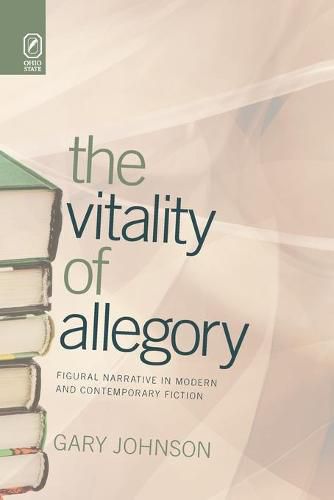Readings Newsletter
Become a Readings Member to make your shopping experience even easier.
Sign in or sign up for free!
You’re not far away from qualifying for FREE standard shipping within Australia
You’ve qualified for FREE standard shipping within Australia
The cart is loading…






This title is printed to order. This book may have been self-published. If so, we cannot guarantee the quality of the content. In the main most books will have gone through the editing process however some may not. We therefore suggest that you be aware of this before ordering this book. If in doubt check either the author or publisher’s details as we are unable to accept any returns unless they are faulty. Please contact us if you have any questions.
In The Vitality of Allegory Gary Johnson argues that the rumors of allegory’s death have been greatly exaggerated. Surveying the broad landscape of modern and contemporary narrative fiction, including works from Europe, Africa, and North America, Johnson demonstrates that, although wholly allegorical narratives have become relatively rare, allegory itself remains a vibrant presence in the ongoing life of the novel, a presence that can manifest itself in a variety of ways.Working from the premise that conventional conceptions of allegory have been inadequate, Johnson takes a rhetorical approach, defining allegory as the transformation of some phenomenon into a figural narrative for some larger purpose. This reconception allows us to recognize that allegory can govern a whole narrative–and can do so strongly or weakly–or be an embedded part or a thematic subject of a narrative and that it can even be used ironically. By developing these theoretical points through careful and insightful analysis of works such as Jackson’s The Lottery, Orwell’s Animal Farm, Kafka’s The Metamorphosis and The Trial, Achebe’s Things Fall Apart, Roth’s American Pastoral, Mann’s Death in Venice, Coetzee’s Elizabeth Costello, and several works by John Barth, Johnson himself transforms our understanding of allegory and of the history of the modern and contemporary novel.
$9.00 standard shipping within Australia
FREE standard shipping within Australia for orders over $100.00
Express & International shipping calculated at checkout
This title is printed to order. This book may have been self-published. If so, we cannot guarantee the quality of the content. In the main most books will have gone through the editing process however some may not. We therefore suggest that you be aware of this before ordering this book. If in doubt check either the author or publisher’s details as we are unable to accept any returns unless they are faulty. Please contact us if you have any questions.
In The Vitality of Allegory Gary Johnson argues that the rumors of allegory’s death have been greatly exaggerated. Surveying the broad landscape of modern and contemporary narrative fiction, including works from Europe, Africa, and North America, Johnson demonstrates that, although wholly allegorical narratives have become relatively rare, allegory itself remains a vibrant presence in the ongoing life of the novel, a presence that can manifest itself in a variety of ways.Working from the premise that conventional conceptions of allegory have been inadequate, Johnson takes a rhetorical approach, defining allegory as the transformation of some phenomenon into a figural narrative for some larger purpose. This reconception allows us to recognize that allegory can govern a whole narrative–and can do so strongly or weakly–or be an embedded part or a thematic subject of a narrative and that it can even be used ironically. By developing these theoretical points through careful and insightful analysis of works such as Jackson’s The Lottery, Orwell’s Animal Farm, Kafka’s The Metamorphosis and The Trial, Achebe’s Things Fall Apart, Roth’s American Pastoral, Mann’s Death in Venice, Coetzee’s Elizabeth Costello, and several works by John Barth, Johnson himself transforms our understanding of allegory and of the history of the modern and contemporary novel.